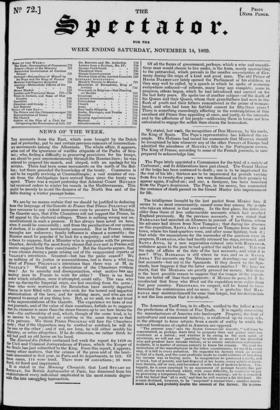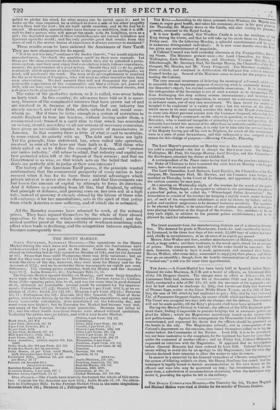The American Tariff has, in its effects, verified to the
fullest extent the predictions of the friends of Free Trade. It is rapidly convert ing the manufacturers of America into bankrupt/. Property, the fruit of agricultural and commercial industry, is swallowed up on e% cry ,He, in the attempt to force returns from a mode of outlay to which the natural tendencies of capital in America are opposed. "The present year," says the Boston Commercial Gazette, " will long he remembered, as perhaps more fatal to property than any period since our existence as a nation ; and whether it be owing to the rash spirit of adventure, we will not say 'gambling,' to which so many of the miscalled wise and prudent have become victims, or to events unforeseen and uncon- trollable, it is matter of serious concern to know the remedy. We read the misfortune of the manufacturer in the fallen countenance, we see it in every step, it is felt in every pulsation. He regarded his factory stock as secure as that of a bank, and the most profitable mode he could contrive of investing his income was in buying more. In imagination he possessed a castle, not of brick, but of granite, and had disposed of his house, every an iele of furni- ture therein, old or new, and furnished it with that of modern fashion. Un- happily, he is soon surprised by an assessment of perhaps twenty-tive per cent, on the stock aforesaid, which, with some difficulty, he contrives to pay by procuring a temporary loan. This is the first warning ; yet he is consoled with the belief that all is well,' and that he will receive a fat dividend. He is soon destined, however, to be surprised' a second time ; another assess- ment is laid, and probably double the amount of the former. He is com. pelled to pledge his stock for what money can be raised upon it; and to make up the sum required, he is obliged to force a sale of his other property
at less than half the cost ; his air-built castle vanishes, and in the end he is ruined. Meanwhile, manufactures have become so worthless, that it is diffi- cult to find a person who • will accept the stack, with its liabilities, even as a gift; the degraded inmates of tirese establiShments ate turned friendless Ind ignorant upon the world ; and the only possible good that results from this mass of evil is the severe lesson of experience it always conveys to mankind." .
These results seem to have sickened the Americans of their Tariff. They are now clamorous for its repeal. • -
" If it be not too late," continues the Boston Gazette," we would enjoin the manufacturers, 'to check the gambling spirit' by their own example. Let
them use the same exertions to abolish which they did to establish a perni- cious system, and they may enjoy that consolation which follows repentance, namely, the performance of a good action. Should they fail to do so, public sentiment, which appears as irresistible as the progress of an earthquake, we . trust, will accelerate the work. The hour of its accomplishment is reserved for the next Session of' Congress, who will need no other incentive than their
own observation. We feel assured they will not disappoint the just and reasonable expectation of the community; and that a certain act, passed in 1828, will ere long only be remembered as a stain on the national annals, and a disgrace to its projectors."
The value of the protective system, as it- is called, was never before so fairly tried. In this country, its advocates have told us it is neces-
sary, because of the complicated interests that have ,grown out of and are involved in it, because of the direction that our industry has already received, and of the Debt, which, without its aid, would over- whelm us. But if there be virtue enough in a system of restriction to
enable England to hear her burdens, without reeling under them i a commercial code framed in a spirit akin to that which has nourished
us so long, should, accordmg to all our notions of necessary connexion, have given an irresistible impulse to the growth of manufactures in America. In that country there is little of what is said to neutralize. to some extent, its activity with us. The debt and taxes are light Yet the principle, thus unfettered, has, when called into operation, involved in ruin all who have put their faith in it. Will those who . lately called on us to follow the example of America, and "protect our native industry," still refuse to admit, that industry and capital are best protected when left at the disposal of their owners ; and that no Government is so wise, as that which acts on the belief that indivi- duals are perfectly able to judge of their own interests ? The history of the American Tariff proves, if the principle wanted confirmation, that the commercial prosperity of every nation is best secured when it has for its basis those natural advantages which private interest is never slow to discover ; and that Governments can but lessen the amount of capital by attempts to force its direction. And it follows as a corollary from all this, that England, by setting that principle at defiance, and growing corn on her own soil at a high rate, instead of growing it cheaply abroad by the labour of those who will exchange it for her manufactures, acts in the spirit of that policy from which America is now suffering, and of which she is ashamed.
All the Barnsley weavers have returned to work, at the reduced prices. They have injured themselves by the whole of their absurd opposition to the wages which circumstances prescribed; and fur- nished another proof of the impossibility of workmen combining with effect when trade is declining, and the competition between capitalists becomes consequently less:



















